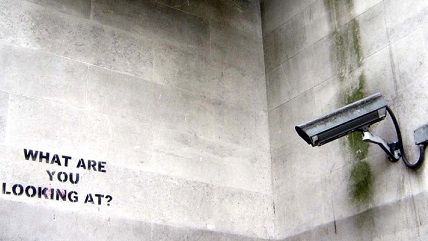Cities Embrace Surveillance State
Little Brother is watching.

On Tuesday, Anaheim became the latest in a growing list of California cities to install police-monitored cameras in public places—in this case, three public parks. The impetus: Two years ago, a 9-year-old girl was tragically shot to death near Brookhurst Community Park after getting caught in the crossfire between rival gangs.
Locals understandably want safer parks. The Register's account of the vote quotes critics who refer to George Orwell's 1984, about a dystopian future where "Big Brother is watching you." That's a legitimate fear, as cities embrace cameras virtually everywhere. Some localities, such as San Diego County, employ facial-recognition software to identify crime suspects, which is even creepier than anything in that famous novel.
Big Brother—some big, all-knowing leader—might not be watching us. But Little Brothers and Sisters—police officials, as they sip coffee in some headquarters monitoring room—certainly are watching. How free can we be if we're constantly under surveillance? Another quotation jumps to mind: "Quis custodiet ipsos custodes?" It's Latin from poet Juvenal: "Who will guard the guards themselves?"
That's the biggest problem with these systems. "Experts studying how the camera systems in Britain are operated have also found that the mostly male (and probably bored) operators frequently use the cameras to voyeuristically spy on women," according to an American Civil Liberties Union analysis of nationwide public video surveillance. There's little oversight of how the cameras and databases are used, although Anaheim has sought input from civil libertarian groups.
Law enforcement scandals are disturbingly common. The Orange County District Attorney's Office is dealing with a "snitch" scandal. The Santa Ana Police Department received bad publicity recently from the state auditor for improperly entering people into its gang database. The Sheriff's Department has had black eyes, too, including a past sheriff sent to prison. Then there was the release of a shocking report in 2007 about the department's handling of a jailhouse beating death.
These are not related to videos per se, but a reminder of that Latin quotation. If the public needs to be monitored, who monitors the monitors? And who monitors the monitors overseeing the monitors? That latter question is not rhetorical flourish—the aforementioned report revealed disturbing facts about the people in charge of overseeing the police.
That's not to dismiss all uses of cameras. Body cameras worn by patrol officers have been amazingly effective at cutting down on abusive behavior by police and by the people with whom they interact. Cameras have ensnared cops whose stories don't jibe with the facts and they've also exonerated cops facing false accusations. These cameras, however, are a far cry from the general monitoring of our public spaces. They involve the specific monitoring of interactions between police and the public. In those cases, it's entirely appropriate for the incidents to be caught on camera.
Of course, surveillance cameras have helped catch criminals. We're used to being on camera when we go into privately owned public venues, such as stores, hotels, bars and concert halls. So it's not an entirely clear-cut situation. Anaheim Mayor Tom Tait, also concerned about a slippery slope toward excessive public monitoring, reminded me that some of the city's parks are out of control. He pointed to the Hawthorne Effect, where people behave differently when they know they are being monitored.
There's little expectation for privacy in a city park. I'm not sure about Anaheim's parks, but the ones near me are hotbeds for crime, homelessness, public defecation and drug use. But where does it end? "The City Council was also open to a future phase integrating into one monitoring network existing cameras at traffic lights, City Hall, Angel Stadium and other city-owned facilities," according to the newspaper. How long before we're always on camera every time we leave the house?
The report noted that 10 to 15 officers will "remotely monitor the cameras," and will employ loudspeakers to address people in the park. That's a lot of people to monitor three parks. It's also a lot of money—$460,000—to install 21 to 30 cameras. It's only government money, but I'm guessing a computer geek could get the job done for a fraction of that cost.
This raises another more practical concern. Are police more effective sitting in a room and watching monitoring screens of far-off locations, or are they better off engaging in on-the-ground community policing? Instead of bellowing orders over a sound system, shouldn't they be patrolling the park and talking with the people who frequent it?
Then again, it's harder to patrol parks and work with residents than it is to sit far away in a room watching a screen. That brings to mind yet another quotation, from Orson Welles' 1958 movie, Touch of Evil: "A policeman's job is only easy in a police state." As the city expands its program further, officials ought to worry less about making police jobs easy and more about protecting their residents in a way that also protects their privacy.


Show Comments (49)